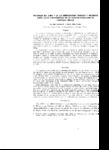Influencia del clima y de las fertilizaciones potásica y molíbdica sobre varias características de un alfalfar establecido en Chapingo, México
Abstract
Se realizó un experimento tendiente a determinar la influencia de las condiciones climáticas, la edad y la fertilización potásica y molíbidica, sobre el rendimiento y longevidad de un alfalfar establecido en terrenos de la Estación Agrícola Experimental de la Escuela Nacional de Agricultura en Chapingo, México. Se hicieron aplicaciones de potasio en diferentes dosis y frecuencias. Se probó también molibdeno en presencia y ausencia de fertilización potásica. Ninguno de los dos elementos ntrientes estudiados tuvo influencia sobre el rendimiento del alfalfar o el mantenimiento de la población a través del tiempo, ni tampoco sobre la altura de las plantas, el contenido de humedad, nitrógeno o potasio del follaje. Las temperaturas medias inferiores a los 18º C limitaron la emisión de nuevos tallos y redujeron el rendimiento. En la mitad del verano, el contenido de nitrógeno, y por lo tanto la calidad de la alfalfa se redujeron fuertemente. Las lluvias favorecieron el desarrollo de hierbas, aunque el cultivo llevó riegos periódicos. Con la edad, las plantas perdieron habilidad para absorber el potasio del suelo y para acumular nitrógeno en sus tejidos. Con el tiempo, la población y los rendimientos de alfalfa se abatieron incrementándose la incidencia de hierbas. La posible prolongación de la vida útil de los alfalfares de esta zona debe por lo tanto estudiarse en función de factores diferentes de la fertilización potásica o molíbdica. ABSTRACT: An experiment was carried out to determine the influence of the climatic conditions, the age of the plants and fertilization with potassium and molybdenum, on the yield and longevity of an alfalfa field established in lands of the Agricultural Experiment Station of the National School of Agriculture, Chapingo, México. Potassium was applied at different rates and frequencies. Molybdenum was added in presence and absence of potassium fertilization. The nutrient elements studied had no influence on the following characteristics of the crop: yield, maintenance of the population, height of plants, and moisture, nitrogen and potassium content of the foliage. Mean temperatures lower than 18º C restricted the appearance of new stems and reduced yield. In middle summer, the nitrogen content and hence the quality of the alfalfa was greatly reduced. Precipitations favored the growth of weeds, although periodical irrigations were applied. With increasing age, the alfalfa plants lost capacity to absorb potassium from the soil and to accumulate nitrogen in their tissues. As time went by, the population and yield alfalfa were reduced and the incidence of weeds increased. Therefore, the possible extension of the economically useful life of the alfalfa fields in this area, has to be studied in function of factos differents from the fertilization with potassium on molybdenum.
Collections
- Agrociencia [55]

